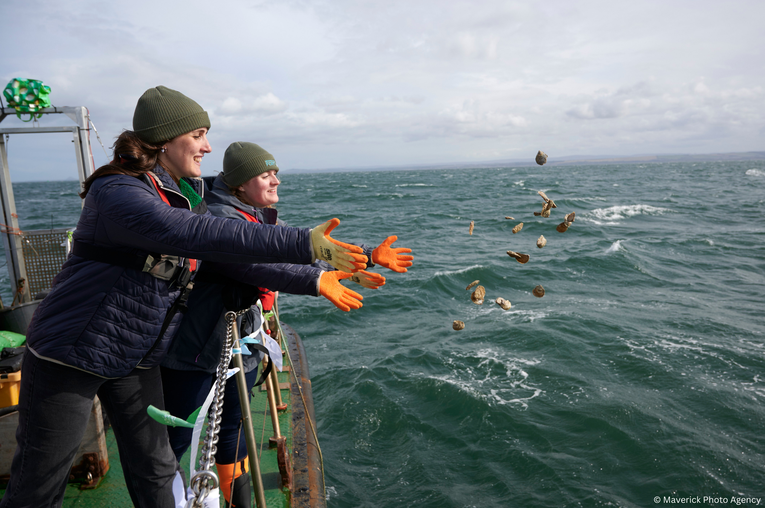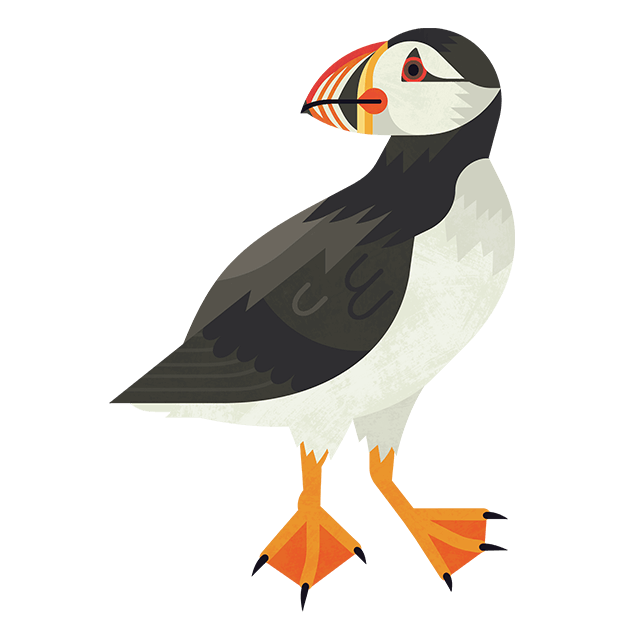
Our top marine conservation stories of 2023
As 2023 nears its end, we're showcasing our favourite Marine Conservation Society stories from this year. From the work we achieved to celebrating our 40th birthday, find out our top stories from 2023.
1. We took the UK Government to court over sewage spills

The Marine Conservation Society team outside Parliament campaigning for sewage-free seas
Credit: Billy Barraclough
We joined a legal case to urge the UK Government’s Department for Environment, Food and Rural Affairs (DEFRA) to address the raw sewage being dumped into English seas.
Although our case was ultimately dismissed by the High Court, we brought a spotlight on this major concern for UK seas. Most importantly, our challenge resulted in the UK Government expanding its Storm Overflows Discharge Reduction Plan. All storm overflows in England will now be included in the Plan, including all coastal and estuary sites, a crucial addition that was initially overlooked.
2. We helped return native oysters to Scottish waters for the first time in 100 years

Emmy and Caitlin deploying adult oysters into the Firth of Forth on the East coast
Credit: Maverick Photo Agency
In September, as part of The Restoration Forth project to restore native oysters back to the Firth of Forth, we helped return the first of 3,000 adult oysters back to their native habitat. This was a massive milestone for an area which has not seen oysters since they were overfished there over 100 years ago. This deployment will ultimately enhance biodiversity, improve water quality and expand the ecosystem in the area.
By the end of the funded Restoration Forth project in 2024, four hectares of seagrass and 30,000 native oysters will have been restored.
3. The Marine Conservation Society turned 40

The Marine Conservation team in the 1990s promoting their vision for Seas Fit for Life
Originally founded in 1983, the Marine Conservation Society grew from the hard work and forward-thinking of a great number of people, many of whom still actively support us today.
We're so proud of the major successes we've achieved in that time to protect local marine wildlife, tackle ocean pollution, promote sustainable seafood, and influence both Government and industry through our ocean campaigns.
We'll continue to do what we can to improve our seas for future generations, and we look forward to seeing what we can accomplish in the next 40 years.
4. Single-use plastic bans were brought in for England and Wales

Plastic cup found on a beach
In October, a ban on single-use plastic items including plastic plates, trays, bowls, cutlery, balloon sticks, and certain types of polystyrene cups and food containers came into effect in England, with Wales also bringing in their own ban soon after.
The push for these important bans was helped by our dedicated volunteers who have participated in recording how much plastic littered our coasts at our annual Great British Beach Clean events since 2017.
We'll be analysing beach cleaning data year-round to see what impact this initial phasing out of plastic will have on UK shores.
5. The launch of the first Beachwatch report

Credit: Aled Llywelyn
With an incredible 13,615 volunteers removing litter all around the UK and over 1,000 litter surveys being sent to us throughout 2022, we released our first Beachwatch report in March.
The report showed just how much litter was picked up in 2022 and the overall state of UK beach pollution. We were very happy to see that the amount of litter found on our beaches has decreased by 11% overall across the UK and Channel Islands since 2021.
Keep an eye out for our 2023 report which we'll be releasing in March next year.
6. We reached our 20,000 marine wildlife sightings milestone in the 20th year

Most commonly spotted jellyfish in the UK based on our wildlife sighting programme
We marked 20 years of our UK marine wildlife survey programme by reaching 20,000 reports from our dedicated supporters. The sightings of jellyfish and turtles have helped us build a picture of life in UK and Irish seas, and track any changes that may occur because of things like climate change.
These sightings have also given our partners, such as the University of Plymouth, valuable data for further study, including population numbers and the different types of amazing wildlife living in our seas.
7. We brought microfibre pollution to the attention of the UK Goverment

The Marine Conservation Society Team handing in 44,000 signatures calling for mandatory microfibre filters for washing machines in 2024
Credit: Victoria Riglen
In November, we handed our Stop Ocean Threads petition in to 10 Downing Street. This contained over 44,000 of your signatures, calling for the introduction of mandatory microfibre filters for washing machines by 2024.
As a result of our work and your signatures, the issue, and solution, to microfibre pollution was recognised in the UK Government’s ‘Plan for Water’. But we still have work to do. We're dedicated to continue to influence washing machine manufacturers to ensure the future protection of our ocean and animals from microfibres.
8. Our Seasearch project celebrated its 35th birthday

Some of the Seasearch team heading out for a dive
Credit: Phil Wilkinson
This year, we celebrated the 35th anniversary of Seasearch, our project for recreational divers and snorkellers who want to get involved in improving the local marine environment.
Through volunteers collecting information about habitats, plants and animals seen under the water, we've accumulated over 35 years of data. This has gone a long way in helping marine research, as well as informing decisions about the protection or regulatory measures of our marine habitats.
We want to thank our partnership with local Wildlife Trusts and other organisations that have been essential in delivering the Seasearch project on the ground, as well as every one of our Seasearch volunteers who have helped make the project such a success.
Want to help? Find out more about what it's like to be part of the project and how you can become a Seasearch volunteer today.



